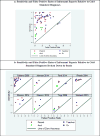Parent-based diagnosis of ADHD is as accurate as a teacher-based diagnosis of ADHD
- PMID: 28271921
- PMCID: PMC5743217
- DOI: 10.1080/00325481.2017.1288064
Parent-based diagnosis of ADHD is as accurate as a teacher-based diagnosis of ADHD
Abstract
Objective: To review the literature evaluating the psychometric properties of parent and teacher informants relative to a gold-standard ADHD diagnosis in pediatric populations.
Method: We included studies that included both a parent and teacher informant, a gold-standard diagnosis, and diagnostic accuracy metrics. Potential confounds were evaluated. We also assessed the 'OR' and the 'AND' rules for combining informant reports.
Results: Eight articles met inclusion criteria. The diagnostic accuracy for predicting gold standard ADHD diagnoses did not differ between parents and teachers. Sample size, sample type, participant drop-out, participant age, participant gender, geographic area of the study, and date of study publication were assessed as potential confounds.
Conclusion: Parent and teachers both yielded moderate to good diagnostic accuracy for ADHD diagnoses. Parent reports were statistically indistinguishable from those of teachers. The predictive features of the 'OR' and 'AND' rules are useful in evaluating approaches to better integrating information from these informants.
Keywords: ADHD; Parent; accuracy; diagnosis; informant; teacher.
Conflict of interest statement
Dr. Joseph Biederman has a financial interest in Avekshan LLC, a company that develops treatments for attention deficit hyperactivity disorder (ADHD). His interests were reviewed and are managed by Massachusetts General Hospital and Partners HealthCare in accordance with their conflict of interest policies. His program has received departmental royalties from a copyrighted rating scale used for ADHD diagnoses, paid by Ingenix, Prophase, Shire, Bracket Global, Sunovion, and Theravance; these royalties were paid to the Department of Psychiatry at MGH. In 2016, he received honoraria from the MGH Psychiatry Academy and InQuill Medical Communications for tuition-funded CME courses, and from Alcobra and APSARD. He is on the scientific advisory board for Arbor Pharmaceuticals. He is a consultant for Akili and Medgenics. He has a US Patent Application pending (Provisional Number #61/233,686) through MGH corporate licensing, on a method to prevent stimulant abuse. The authors have no other relevant affiliations or financial involvement with any organization or entity with a financial interest in or financial conflict with the subject matter or materials discussed in the manuscript apart from those disclosed.
Figures


References
-
- Wiener JM, editor. Textbook of child & adolescent psychiatry. Washington D.C.: American Psychiatric Press, Inc.; 1991.
-
- Talbott JA, Hales RE, Yudofsky SC, editors. Textbook of Psychiatry. Washington, D.C.: American Psychiatric Press, Inc.; 1988.
-
- American Psychiatric Association. Diagnostic and statistical manual of mental disorders (5th ed.) 5. Arlington, VA: American Psychiatric Publishing; 2013.
-
- (AACAP) AAoCaAP. Practice parameter for the assessment and treatment of children and adolescents with ADHD. Washington, D.C.: 2007. - PubMed
Publication types
MeSH terms
Grants and funding
LinkOut - more resources
Full Text Sources
Other Literature Sources
Medical
Miscellaneous
